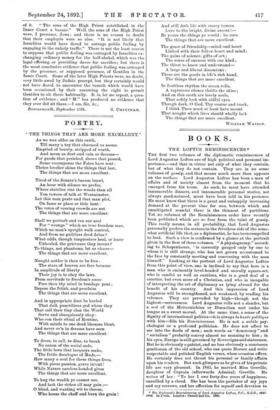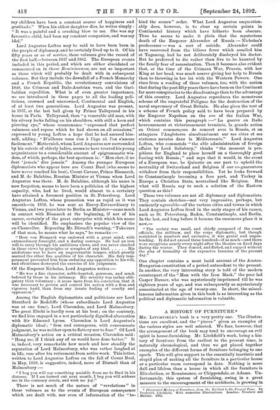BOOKS.
THE LOFTUS REMINISCENCES.*
THE first two volumes of the diplomatic reminiscences of Lord Augustus Loftus are of high political and personal im- portance,—and that in virtue not only of what they contain, but of what they do not contain. They are in no sense volumes of gossip, and that means much more than appears on the surface. Lord Augustus Loftus has been a man of affairs and of society almost from the moment that he emerged from his teens. As such, he must have attended innumerable dinners, and innumerable personal stories, not always good-natured, must have been told in his presence. He must know that there is a great and unhappily increasing demand at the present time for ana, between which and unmitigated scandal there is the thinnest of partitions. Yet no volumes of the Reminiscences order have recently been published which are so free from the taint of gossip. This really means, in all probability, that Lord Augustus personally prefers the serious to the frivolous side of the some- what artificial life that, as a diplomatist, he has been compelled to lead. Such a view is confirmed by a glance at the portrait given in the first of these volumes. " A physiognomy," accord- ing to Schopenhaner, " is correctly gauged only by one to whom it is still strange, who has not grown accustomed to the face by constantly meeting and conversing with the man himself." Looking at the portrait of Lord Augustus Loftus from this point of view, one is inclined to say that here is a man who is eminently level-headed and morally square-set, who is candid as well as cautious, who is a good deal of a courtier, but even more of a Christian, and who is incapable of interpreting the art of diplomacy as lying abroad for the benefit of his country. And this impression of Lord Augustus will be strengthened, not weakened, by reading his volumes. They are pervaded by high—though not the highest—seriousness. Lord Augustus rolls not a slander, but a mot of the Metternichian or Disraelian sort under his tongue as a sweet morsel. At the same time, a sense of the dignity of international politics—it is always la haute politique with him—fills his Reminiscences. He is not a subtle psy- chologist or a profound politician. He does not affect to see into the deeds of men ; such words as " democracy" and " socialism" probably convey almost no meaning to him ; in his eyes, Europe is still governed by Sovereigns and statesmen. Bat he is obviously a patriot, and no less obviously a courteous gentleman of the old school, who can quote Horace and write respectable and polished English verses, when occasion offers. He certainly does not thrust his personal or family affairs upon his readers. But such glimpses as he gives of his private life are very pleasant. In 1845, he married Miss Greville, daughter of Captain (afterwards Admiral) Greville. He writes of her : " To her I owe forty-five years of happiness, unsullied by a cloud. She has been the partaker of my joys and my sorrows, and her affection for myself and devotion to • The ISplontatie Reminiscences of Lord Augustus Loftus, P.C., O.C.B., 1860, In 2 vols. London; Cassell and Co. 1892.
my children have been a constant source of happiness and gratitude." When his eldest daughter dies, he writes simply : " It was a painful and a crushing blow to me. She was my favourite child, had been my constant companion, and was my idol."
Lord Augustus Loftus may be said to have been born in the purple of diplomacy, and he certainly lived up to it. Of his fifty years or so of service, these volumes give the record of
the first half,—between 1837 and 1862. The European events included in this period, and which are either elucidated or commented on in these Reminiscences, are not so important as those which will probably be dealt with in subsequent volumes. But they include the downfall of a French Monarchy
and a French Republic, the revolutionary convulsions of 1848, the Crimean and Italo-Austrian wars, and the Gari- baldian expedition. What is of even greater importance, we are introduced in these pages to all the leading poli- ticians, crowned and uncrowned, Continental and English,
of at least two generations. Lord Augustus was present, in 1837, at the last ball given by Prince Talleyrand in his
house in Paris. Talleyrand, then "a venerable old man, with his silvery locks falling on his shoulders, with still a keen and piercing eye," whose countenance " expressed that perfect calmness and repose which he had shown on all occasions," expressed to young Loftus a hope that he had amused him- self, adding : " D'ailleurs vous etes a rage ou l'on s'amuse facilement." Metternich, whom Lord Augustus saw surrounded by his coterie of elderly ladies, seems to have treated his young acquaintance to a considerable amount of epigrammatic wis- dom, of which, perhaps, the best specimen is : " Mon cher, it ne hut jamais' dire jamais." Among the younger European diplomatists who appear here are Count Buol (who seems to have never reached his best), Count Cavour, Prince Bismarck, and M. de Balabine, Russian Minister at Vienna when Lord Augustus was there. M. de Balabine, although his name is now forgotten, seems to have been a politician of the highest capacity, who, had he lived, would almost to a certainty have attained a foremost position in St. Petersburg. Lord Augustus Loftus, whose promotion was as rapid as it was smooth—in 1858, he was sent as Envoy-Extraordinary to Vienna, and two years later to Berlin as Minister—came much in contact with Bismarck at the beginning, if not of his career, certainly of the great enterprise with which his name will be identified. He emphasises the popular view of the ex-Chancellor. Repeating Mr. Disraeli's warning, " Take care of that man, he means what he says," he remarks :-
" Herr von Bismarck was endowed with a great mind, with extraordinary foresight, and a daring courage. He had an iron will to carry through his ambitious views, and was never checked
in these views by principles or scruples of any kind His misfortune was to have an ungovernable temper, which greatly marred the other fine qualities of his character. His fiery tem- perament prevented him from enduring any opposition to his will, and oftentimes destroyed the exercise of his judgments.
Of the Emperor Nicholas, Lord Augustus writes :—
" He was a fine character, noble-hearted, generous, and much beloved by those in his intimacy. His severity was rather obli- gatory than voluntary ; it arose more from his conviction that it was necessary to govern and control his nation with a firm and vigorous hand, than from any innate feeling of cruelty and oppression."
Among the English diplomatists and politicians are Lord Stratford de Redcliffe (whose subordinate Lord Augustus was at one time), Lord Clarendon, and Lord Malmesbury. The great Eltchi is hardly seen at his best ; on the contrary, we find him engaged in a not particularly dignified altercation with Sir Edmund Lyons. Clarendon is Lord Augustus's diplomatic ideal ; " firm and courageous, with consummate judgment, he was neither open to flattery nor to fear." Of Lord Malmesbury's action on a critical occasion, Clarendon said :
"Hang me, if I think any of us would have done better." It is, indeed, very remarkable how much and how steadily the reputation of Lord Malmesbury, who was rather laughed at in life, rose after bis retirement from active work. This letter, written to Lord Augustus Loftus on the fall of Count Buol, in May, 1859, is suggestive, indeed, more of Disraeli than of Malmesbury :—
" I beg you will say something amiable from me to Buol in his distress. If I am turned out next month, I beg you will address me in the contrary strain, and wish me joy."
There is not much of the nature of " revelations " in these volumes as to the events of European consequence which are dealt with, nor even of information of the "be- hind the scenes" order. What Lord Augustus unquestion-
ably does, however, is to clear up certain points in Continental history which have hitherto been obscure.
Thus he seems to make it plain that the mysterious death of the Emperor Alexander of Russia — Nicholas's predecessor—was a sort of suicide. Alexander could have recovered from the bilious fever which assailed him at Taganrog, had he not deliberately disobeyed his doctor. But he preferred to die rather than live to be haunted by the family fear of assassination. Then it becomes also evident that, at the time of the Crimean War, Prussia, with her King at her head, was much nearer giving her help to Russia than to throwing in her lot with the Western Powers. One rises from a reading of these volumes, too, with the notion that during the past fifty years there have been on the Continent far more conspiracies to the disadvantage than to the advantage of this country. Lord Augustus reproduces the monstrous scheme of the ungrateful Polignac for the destruction of the naval supremacy of Great Britain. He also gives the text of a scheme of French policy said to have been prepared by the Emperor Napoleon on the eve of the Italian War, which contains this paragraph :—" La guerre en Italie henreusement et victorieusement terminee, la grande action en Orient commencera de concert avec la Rnssie, et on attaquera rAngleterre simultanement sur ses cotes et ses stationes navales dans la Mediterranee." Lord Augustus Loftus, who commends " the able administration of foreign affairs by Lord Salisbury," thinks " the moment is pro- pitious for England to place herself on a thoroughly good footing with Russia ; " and says that it would, in the event of a European war, be Quixotic on our part to uphold the neutrality of Switzerland and Belgium if our co-guarantors withdrew from their responsibilities. Yet he looks forward to Constantinople becoming a free port, and Turkey in Europe a Christian State, neutralised like Belgium. But what will Russia say to such a solution of the Eastern question as this These two volumes are not all diplomacy and diplomatists.
They contain sketches—not very impressive, perhaps, but eminently agreeable—of the various cities and towns in which Lord Augustus Loftus lived in the early stages of his career, such as St. Petersburg, Baden, Constantinople, and Berlin. In the last, and long before it became the enormous place it is
now,- " The society was small, and chiefly composed of the court officials, the military, and the corps diplomatic, but though restricted in numbers and exclusive, it was genial and unpre- tending. It did not exceed three hundred—if as much—and there were receptions nearly every night after the theatre on fixed days during the winter. They danced, and flirted, and supped without the One of formality or the expensive luxuries of the present day."
One chapter contains a most lucid account of the Austro- Hungarian constitution of a period antecedent to the present.
In another, the very interesting story is told of the modern counterpart of the " Man with the Iron Mask," the poor lad Casper Hauser, who was mysteriously imprisoned till he was eighteen years of age, and was subsequently as mysteriously assassinated at the age of twenty-one. In short, the miscel- laneous information given in this book is as interesting as the political and diplomatic information is valuable.



































 Previous page
Previous page